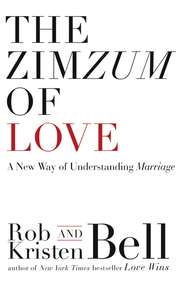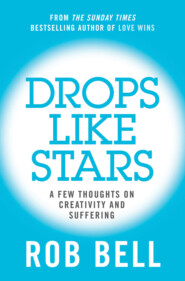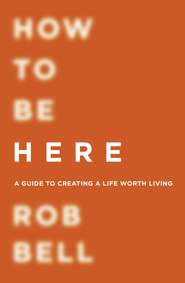По всем вопросам обращайтесь на: info@litportal.ru
(©) 2003-2024.
✖
The Complete Rob Bell: His Seven Bestselling Books, All in One Place
Автор
Год написания книги
2018
Настройки чтения
Размер шрифта
Высота строк
Поля
We alter our air with electric machines.
We spend vast sums of money and energy to change our air. And we drive in air-conditioned cars—the 8 percent of us in the world who have cars—to air-conditioned schools and offices and stores with tile floors and fluorescent lights.
It’s even possible to go days without spending any significant time outside.
And it’s still considered living.
It’s easy to go for weeks and maybe even years without ever actually plunging your hands into soil. Into earth. Into dirt.
But this car— this is the one, the one with the space for my cooler and the kayak that I don’t own. This is the car that will change things.
Massive amounts of money are spent convincing us that this particular automobile will give us access to the mountains, streams, and deserts that we are unable to access at this moment. And when we make that trip, in that car, the one from the commercial, we will be connected with the earth. With our home.
We see this disconnection in the relationship between our sleep patterns and the invention of electricity.1 (#litres_trial_promo) Prior to the lightbulb, people generally went to bed when the sun went down and woke up when the sun came up. With the invention of electric light, sleep habits became less and less regulated by the rising and setting of the sun. As a result, people today get far fewer hours of sleep a night than people did a hundred or two hundred years ago. We even have third-shift jobs in which a person works through the night while it’s dark, and then sleeps through the day while it’s light. All of this affects our connection with nature. Where once the rhythm and flow of life were dictated by the rhythm and flow of the earth, we now live relatively independent of these forces.
There’s no better way to understand how disconnected we are from our environment than to ask the big metaphysical question, the question that has challenged the great minds of our generation and the generations before us, the question that if we had a clear answer for it, would unlock the deepest mysteries of life on this planet:
Where does our trash go?
The truck comes to our place of residence, they dump into the back whatever we dumped into the approved container with the phone number and name of the company on the side, and we think no more of it.
Have you ever later in the day thought to yourself, I hope my garbage made it there safely?
Where is “there”? And how many “theres” are there? And what do they do with it when it gets there? Does every town have a there? Can the people who live next to there smell there? Are there laws about how many theres a town can have? Is there a point at which a there is full? How is this determined? Can the people who run the theres give us a percentage of how full their there is? Do they get together and discuss these sorts of things with other people who own theres?
No, we don’t even think about it. We know that skilled, highly trained people are on the job, and so we don’t spend a moment thinking about it.
Until we go camping. And the sign says to take out everything we take in. And for an hour or a day or a week, we’re highly attuned to what we’re doing to the environment. We pick up every wrapper, we bury everything that should be buried, we wait until every last coal is burned out. All because we don’t want to pay the fine.2 (#litres_trial_promo)
Which of course raises the question, Is there some sort of larger fine that all of us are going to have to pay, as the human race, for our actions? And if we were aware of what that fine was going to be, would we all of a sudden care very much about “there”?
But our disconnection isn’t just with each other and the earth.
Yesterday I was with a friend who recently started a new job. He had taken the job because he had a clear vision for how he could help bring significant change to the company. A few months into the job, he was exhausted. As he sat across the table from me venting about all of the ways he’s frustrated and burned out and tired, something powerful began to happen. He began to remember why he took the job in the first place. He started articulating all of the ways that he had become disconnected from his original vision for the company because of the voices around him telling him how he should do his job. Right before my eyes, he rediscovered his passion for the work he was doing. He repeatedly asked me, “How did I get so off track? How did I become so disconnected from myself?”
We struggle in our connection with the earth, in our connections with each other, and with being connected with ourselves.
But it wasn’t always like this.
In the Beginning
In the first chapter of Genesis, when God creates the first people, he blesses them. This is significant. God’s blessing is the peace of God resting on people. The story begins with humans in right relationship—in healthy, life-giving connection—with their maker. All of their other relationships flow from the health of this one central relationship—people and God. They’re connected with the earth, with each other. They’re naked and feel no shame.
And then everything goes south.
They choose another way.
And they become disconnected.
God goes looking for them in the garden, asking, “Where are you?” The first humans make coverings of fig leaves, and then they’re banished from the garden.3 (#litres_trial_promo)
Disconnected from each other.
Disconnected from the earth.
The woman is told that there is going to be conflict between her and the man. The man is told that there is going to be conflict between him and the soil.
And this is where you and I come in. We were born into a world, into a condition, of disconnection. Things were created to be a certain way, and they’re not that way, and we feel it in every fiber of our being.
Is this why the first thing newborns do is cry?
We’re severed and cut off and disconnected in a thousand ways, and we know it, we feel it, we’re aware of it every day. It’s an ache in our bones that won’t go away.
And so from an early age we have this awareness of the state of disconnection we were born into, and we have a longing to reconnect.
Scholars believe that the word sex is related to the Latin word secare, which means “to sever, to amputate, or to disconnect from the whole.” This is where we get words like sect, section, dissect, bisect.4 (#litres_trial_promo)
Our sexuality, then, has two dimensions. First, our sexuality is our awareness of how profoundly we’re severed and cut off and disconnected. Second, our sexuality is all of the ways we go about trying to reconnect.
Last year I was swimming in the ocean with one of my boys on my back in the midst of a pod of dolphins. They were swimming around us and under us and making their noises, which are incredibly loud and piercing, when one of them shot up into the air above us and did a flip. Right over our heads.
When we describe moments like these, the words we use are rarely about distance. The words we use are about nearness and connection, sometimes even intimacy.
Your friends just got back from hiking, and they say, “We felt like we could just reach out and touch the mountain.”
I just spent an afternoon with a doctor who donates significant amounts of time working with people who have AIDS and can’t afford proper treatment. He loves it. He talked with great passion about the joy it brings him. He’s a successful, educated, wealthy man who loves to spend his time with poor, uneducated people who are from a totally different world than he is. He was telling me how his work brings him a sense of connection, an awareness of the simple truth that we aren’t all that different from each other.
These moments move us because they have a sexual dimension. They help us become reconnected. They go against our fallen nature, which is to be cut off.
This is why music is so powerful. Have you ever noticed that when you ask people why a particular song or concert moved them so much, they often resort to ambiguous explanations? You rarely receive a response such as, “Well, the prolific use of polyrhythms offset with the arpeggiated succession of relative minors touched my heart.”
No, of course not. You get words like emotion and passion and energy and relationship and connection. Music is powerful because it is sexual. It connects us. We generally don’t think of it in those terms, but it’s true. The experience of a great concert—with everybody singing together, waving their hands in the air, and a feeling of oneness permeating the room—has a significant sexual dimension to it. We don’t know each other, we come from vastly different backgrounds, we disagree on hundreds of issues, but for an evening, we gather around this artist and these songs and we get along. The experience moves us so deeply because it taps into how things were meant to be, and we have so few places where we can experience what God intended on such a large scale.
Whether it’s a concert or a church service or a rally for a just cause, certain communal events draw us into something bigger than the event itself. We feel connected with the people we’re having the experience with, and not just connected but aware of something bigger than us all that we’re brushing up against in the process.
What we’re experiencing in these moments of connection is what God created us to experience all of the time. It’s our natural state. It’s how things are supposed to be.
It’s written in the letter to the Ephesians that there’s “one God and Father of all, who is over all and through all and in all.”5 (#litres_trial_promo)
And in the book of Hebrews, it’s written that God is the one “for whom and through whom everything exists.”6 (#litres_trial_promo)
Rethinking Our Definition
If we take this understanding of our natural state seriously, we have to rethink what sexuality is.7 (#litres_trial_promo) For many, sexuality is simply what happens between two people involving physical pleasure. But that’s only a small percentage of what sexuality is. Our sexuality is all of the ways we strive to reconnect with our world, with each other, and with God.8 (#litres_trial_promo)
A friend of mine has given his life to standing with those who have been forgotten and oppressed the most.9 (#litres_trial_promo) He’s in his early thirties, he’s single, and he talks openly about his celibacy. What makes his life so powerful is that he’s a very sexual person, but he has focused his sexuality, his “energies for connection,” on a specific group of people.
Some of the most sexual people I know are celibate.











